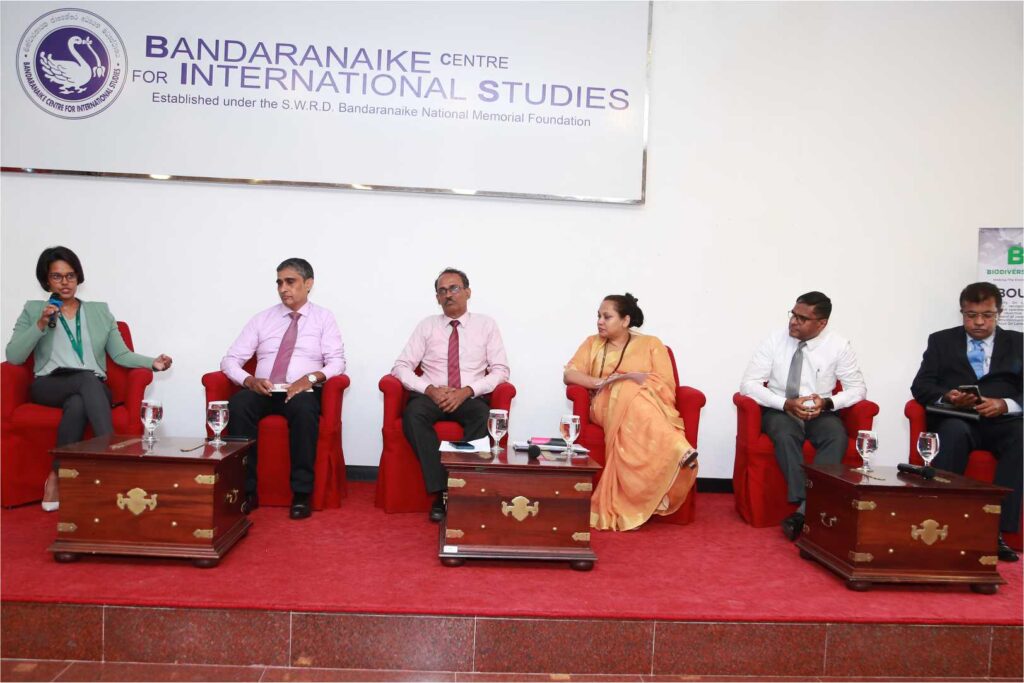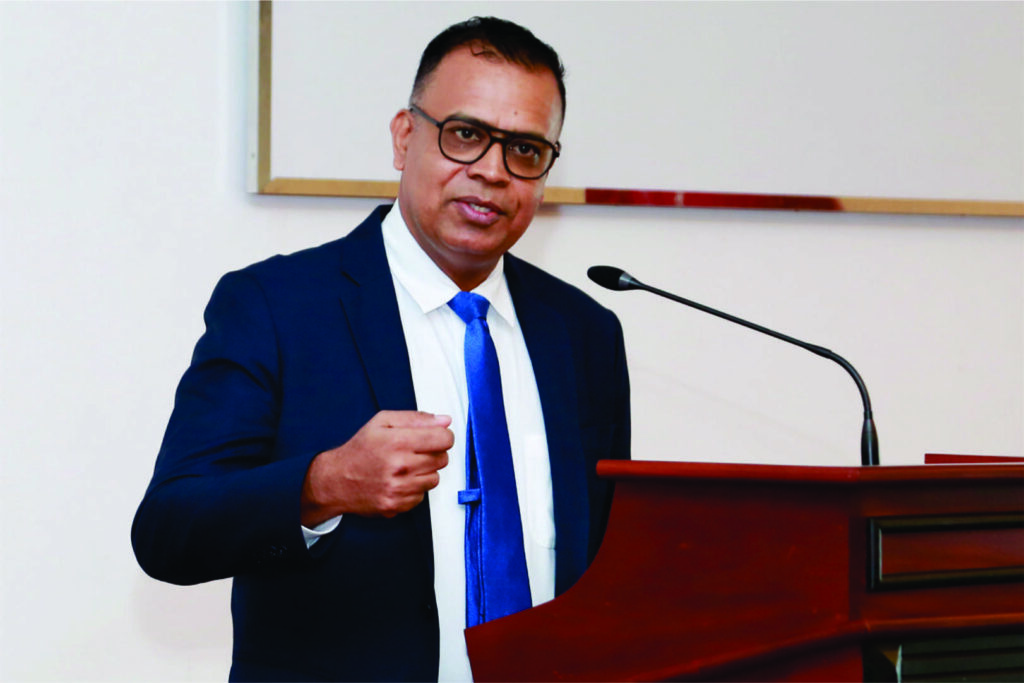
The second segment of Biodiversity Sri Lanka’s Annual Technical Sessions, titled “Climate Risks & Green Finance: Exploring the Intersection”, brought to light the growing convergence between climate change impacts and the financial sector. As climate risks escalate, businesses, particularly in Sri Lanka, must assess how these risks affect their operations, while also exploring green finance as a tool to support climate resilience and sustainable development.
Session Overview
This session focused on the growing intersection of climate risks and green finance, and the need for Sri Lankan businesses to integrate climate resilience into their strategies. Green finance was highlighted as a key tool for funding sustainable projects, enabling companies to reduce their carbon footprint. The private sector, especially banks, was recognised for its crucial role in driving the low-carbon transition through strategic investments.
Resource Persons
The session featured distinguished experts, with Mr Ranga Pallewala delivering the Keynote Address. The interesting panel discussion was moderated by General Manager – Group ESG of Hayleys PLC Ms Prashani Illangasekera. The panelists from both the private sector and state sector Director General – Sustainable Development Council Ms Chamindry Saparamadu, Director Climate Change of the Ministry of Environment Mr Leel Randeni, Vice President (Sustainability & Consulting) of DFCC Bank PLC/DFCC Consulting (Pvt) Mr Nalin Karunatileka, Chief Executive Officer of the National Cleaner Production Center Mr Samantha Kumarasena, and Industrial Development Officer of the Ministry of Industries Mr Lalith Wasantha. The panelists discussed the nexus between climate risks and green finance, global trends in green financing, and the steps Sri Lankan companies need to take to access green finance.
Key themes from the panel discussion:
The panel discussion following the keynote address brought together experts from both the financial and environmental sectors to discuss practical strategies for managing climate risks and advancing green finance in Sri Lanka. Key points from the discussion included:
- Regulation and Policy Support: Panelists emphasised the growing regulatory push for climate-related financial disclosures. Governments and regulators are increasingly holding businesses accountable for their climate impact, which is expected to lead to better risk management and transparency. Sri Lanka is no exception, with evolving policies encouraging companies to align with global sustainability standards.
- Investment in Green Projects: Sri Lanka is well-positioned to benefit from green finance, particularly in areas like renewable energy, eco-tourism, and climate-resilient agriculture. These sectors not only offer financial returns but also help the country meet its climate goals. The panel highlighted the need for increased investment in these areas to drive sustainable economic growth.
- Long-term Business Resilience: Incorporating climate risks into corporate and financial strategies is vital for building long-term resilience. The panel discussed how companies that fail to account for climate risks may face financial instability, while those that proactively invest in sustainable practices will be better equipped to navigate future challenges.

Opportunities to Access Green Finance
In this session, Mr. Ranga Pallewala, a global expert on green finance, delivered a thought-provoking keynote address. He outlined how climate change is not only an environmental challenge but also a significant financial risk, particularly for industries reliant on natural resources. His speech underscored the importance of integrating climate considerations into financial decision-making and highlighted the potential of green finance to fund climate-friendly initiatives. Here are the key takeaways from his address:
Financial institutions and businesses have a crucial role in promoting climate resilience. By financing green initiatives, banks and investors can support sustainable development while protecting their own long-term financial interests. The need for businesses to move away from carbon-intensive industries and toward climate-friendly investments was also highlighted.
Climate risks, including extreme weather events and rising temperatures, are affecting business operations in Sri Lanka. Industries such as agriculture, tourism, and real estate in Sri Lanka are particularly vulnerable. Mr. Pallewala stressed that failing to account for these risks in financial planning could result in severe economic consequences.
Green finance, including tools like green bonds and sustainability-linked loans, offers companies the chance to secure funding for projects that promote environmental sustainability. This includes investments in renewable energy, sustainable agriculture, and projects aimed at reducing carbon emissions. Mr. Pallewala emphasized that green finance is not just a niche market—it is becoming central to the future of sustainable business.
Panel Discussion Highlights
Climate change poses financial risks to key industries in Sri Lanka, such as agriculture, fisheries, and tourism. Companies must integrate climate resilience into their strategies to safeguard against economic disruptions caused by extreme weather and environmental changes.
Green finance offers local businesses the opportunity to invest in sustainable projects like renewable energy, waste management, and eco-friendly agriculture. By leveraging options such as green bonds, Sri Lankan companies can achieve both environmental protection and economic growth.
The private sector in Sri Lanka, particularly banks and financial institutions, has a vital role in promoting a low-carbon economy. By funding green projects, they can lead the transition to sustainable practices while ensuring long-term profitability.
As regulatory frameworks evolve in Sri Lanka, businesses must enhance transparency in disclosing their environmental impact. Adapting to these climate-related regulations will help companies align with national sustainability goals and maintain market competitiveness.
Call to Action
Segment 2 of the Annual Technical Sessions highlighted the urgent need for businesses to incorporate climate risks into their financial planning and leverage the opportunities presented by green finance. With insightful contributions from Mr. Ranga Pallewala and a dynamic panel discussion, the session underscored that addressing climate risks is not only critical for environmental sustainability but also for long-term business resilience. By embracing green finance, Sri Lankan companies can lead the way in building a more sustainable and climate-resilient future.



